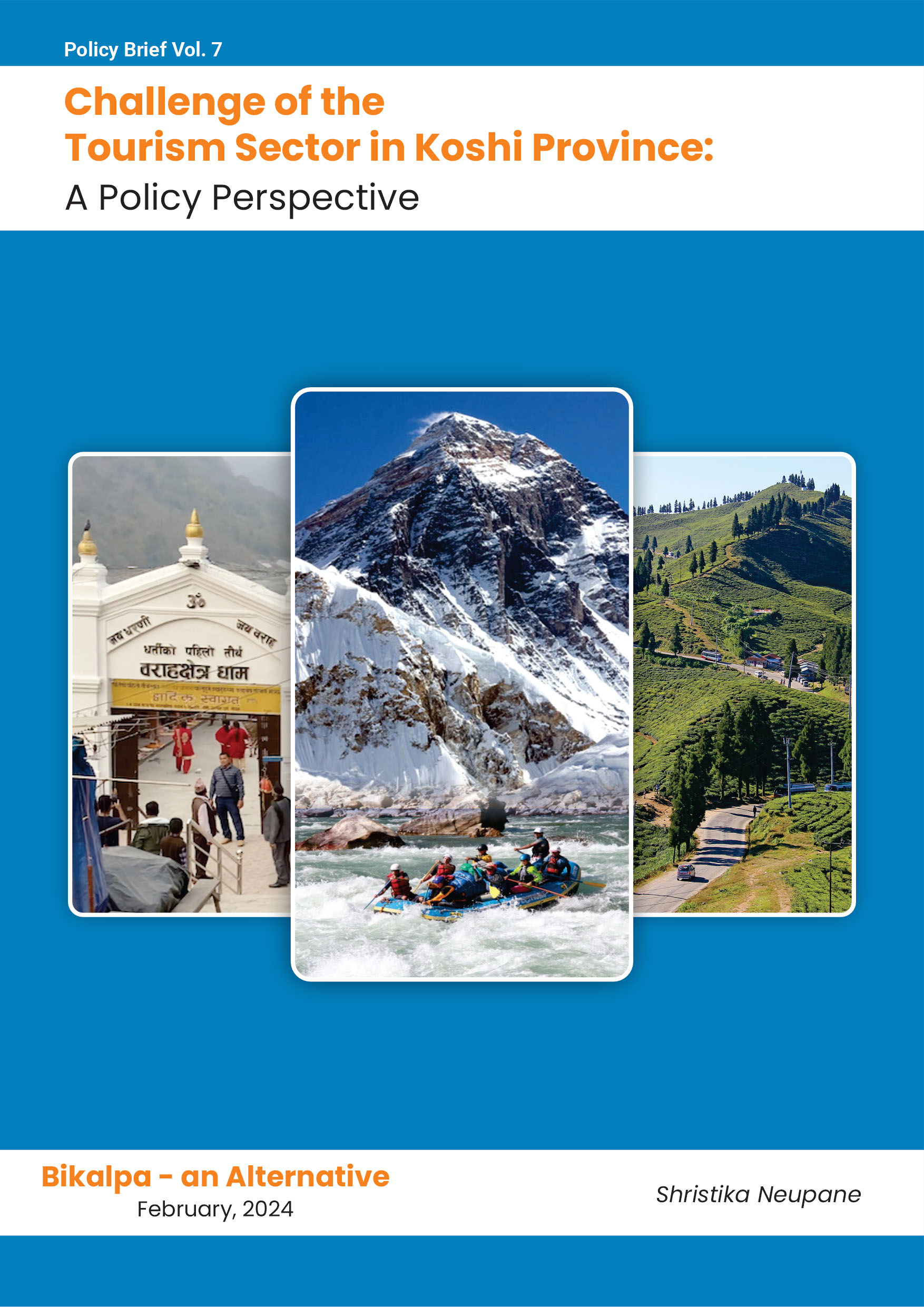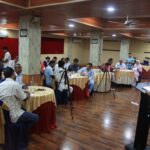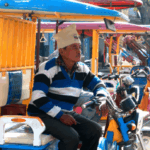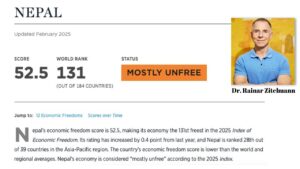On 25th September 2025, Bikalpa an Alternative organized the Award distribution ceremony for the Journalist under ‘Enhancing the Capacity of Media Houses and Journalist in Koshi Province’ program in collaboration with International Alert and the Federation of Nepalese Journalist Koshi Province, Morang, and Sunsari. The program aimed to promote investigative journalism by recognizing and awarding the selected journalist who have created positive impact in society by their investigative journalism.
Among the journalists who received the fellowship were Binod Subedi of Nagarik Daily, Cheena Thapa of Sunaulo Nepal, Kishor Budhathoki of Annapurna Post, and Parbat Portel of Kantipur Daily. Based on the open application call announced by Bikalpa, four journalists were selected for the fellowship.

The event was moderated by the Journalist Nishant Dhungana, He began the event by welcoming all 40 participants, fellowship recipients and guest which includes, Prof. Dr. Bhesh Prasad Dhamala, Chairperson of Bikalpa an Alternative, Mr. Bharat Khadka, Chairperson of the Federation of Nepali Journalists (FNJ), Koshi Province, Miss. Sushila Pathak, Chairperson of the FNJ Morang, Mr. Bikram Luitel, Founding Chairperson of FNJ Koshi Province, and Mr. Bandhu Pokharel, Former FNJ Morang Chairperson.
Following this, Miss. Ranu Sah, Program Coordinator at Bikalpa, shared the objectives and relevance of the event, while she also mentioned that one documentary will be made in upcoming days among four journalist to highlight the contribution of good journalism practice, whereas Founder and Executive Director of Bikalpa an Alternative, Mr. Basanta Adhikari, informed that the organization has been working for the past 10 years for livelihood, freedom, and the right to earn a living. He expressed the belief that through the fellowship, journalists would gain strength to pursue more responsible and empowered journalism.

After this, the floor was given to Fellowship recipients to share the work they had carried out.
Mr. Binod Subedi shared about his work and effort to raise the issue of Juvenile Rehabilitation Center located in Biratnagar – 3 since its establishment. In the past, there was no Juvenile Rehabilitation Center in Biratnagar. After continuous pressure from organizations working in the field of child rights in Biratnagar, journalists, and civil society, a building for the Juvenile Rehabilitation Center was constructed and brought into operation. Even after operation, children in conflict with the law have not been able to experience a child-friendly environment there. Due to the narrow and congested space, the children residing in the reform home face difficulties in living, sleeping, and resting properly. With repeated media coverage and pressure on the state highlighting the need to reform the Juvenile Rehabilitation Center itself, the Federal Parliamentary Committee also carried out an inspection last Poush. Although the committee submitted its report with recommendations for improvement to the government, no significant reforms have been implemented in the Juvenile Rehabilitation Center so far. So, Binod is dedicated in improving the condition of Juvenile Rehabilitation Center through his Journalism.
Miss. Cheena Thapa shared about her work to make province and local government transparent while allocating budget. When the provincial and local governments allocate lump-sum budgets without specifying programs. For example, when they mention “maintenance,” it is not clarified what exactly is to be maintained. As a result, the funds can later be distributed in any manner. Miss Thapa’s concern was that the taxes paid by the people must be utilized properly, and while bringing the budget, the provincial and local governments should not be guided by political interests. So, she wrote many investigative news and articles in this issue to highlight this in public and pressurize the authorities for change and transparency.

Mr. Parbat Portel shared his work and effort to raise the issue of an indigenous woman from Jhapa who was found unconscious while working abroad in Oman. She had reached Oman through illegal channels in search of employment. There, she was suddenly found unconscious and was admitted to a hospital. After Mr. Portel responsibly reported and publicized this incident, the government immediately took interest. As a result, the government itself became active and sent her son to Oman so that he could understand his mother’s condition closely. Since the woman was in a coma, it was not possible to bring her back to Nepal for treatment. However, she is now undergoing treatment in a good hospital in Oman. This incident demonstrates that responsible journalism and sensitivity toward human rights can draw the government’s attention. It also conveys the message that the state must take the problems faced by citizens from poor and marginalized communities in foreign employment seriously. Essentially, the voice raised by Mr. Portel compelled the Government of Nepal to become active, leading the state to intervene in the life-threatening crisis of a poor indigenous woman.
Mr. Kishor Budhathoki shared his work and effort to expose the widespread misuse of travel allowances in the Ministry of Economic Affairs and Planning, as well as other ministries under the Koshi Provincial Government, and highlighted the need for a solution. Especially after the country adopted federalism, provincial governments were formed. These governments established their ministries, but various forms of corruption and irregularities emerged there. On this issue of irregularities, Mr. Budhathoki prepared an investigative report for the Center for Investigative Journalism. It revealed that government employees were collecting millions of rupees in travel allowances without actually traveling, without evidence, and based on incomplete reports. By making this fact public, the report brought to light the misuse of state funds, weaknesses in the auditing system, and problems of administrative irregularities. His report not only exposed the problem but also sought possible solutions. It showed that legal provisions such as the Travel Expense Regulation, Financial Directives, and the Anti-Corruption Act had been violated, and emphasized the need for strict enforcement of rules, transparent auditing, improved monitoring, and action against those responsible. At the same time, it pointed towards long-term policy measures such as reforming the governance system, ensuring frugality in public expenditure, and strengthening citizen engagement. Ultimately, the report created strong and serious pressure to ensure accountability and transparency within the state apparatus.

At the ceremony, Mr. Bharat Khadka, Chairperson of the Federation of Nepali Journalists (FNJ), Koshi Province, gave speech and praised Bikalpa for handing over the fellowship with the objective of making journalism more responsible and empowered. He expressed optimism that the Federation of Nepali Journalists (FNJ) would continue to work together with Bikalpa in the future to further strengthen journalism.
Following this, Miss. Sushila Pathak, Chairperson of the FNJ Morang, Mr. Bikram Luitel, Founding Chairperson of FNJ Koshi Province, and Mr. Bandhu Pokharel, former FNJ Morang Chairperson also gave speech and offered their best wishes to Fellowship recipients and Bikalpa an Alternative.
At the end, fellowships amount up to Rs 2,00,000, Rs 50,000 each was awarded and handed to four journalists, Binod Subedi of Nagarik Daily, Cheena Thapa of Sunaulo Nepal, Kishor Budhathoki of Annapurna Post, and Parbat Portel of Kantipur Daily.
The event was formally concluded by Chairperson of Bikalpa, Prof. Dr. Bhesh Prasad Dhamala. While giving the speech, he mentioned that journalists are campaigners against distortions and anomalies in society, and therefore must always remain serious in their profession. He further remarked that since society places its trust in the pen of journalists, they play a significant role in spreading either positivity or negativity in society.

News coverage:











